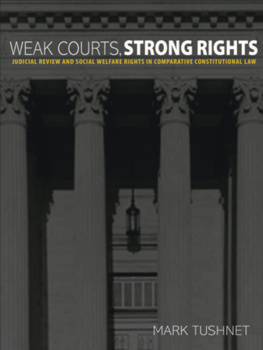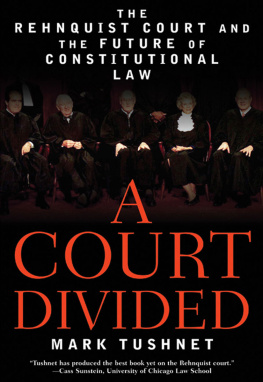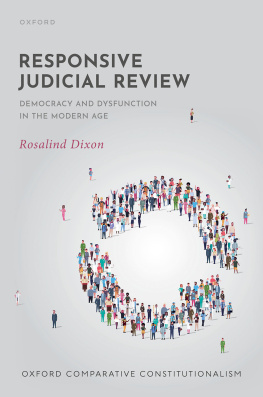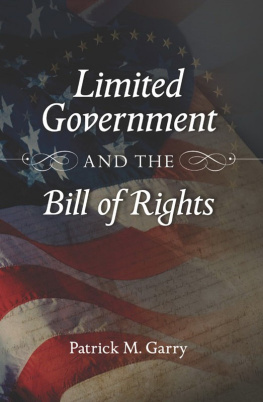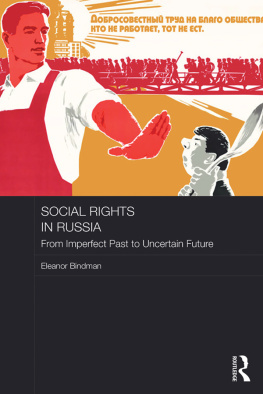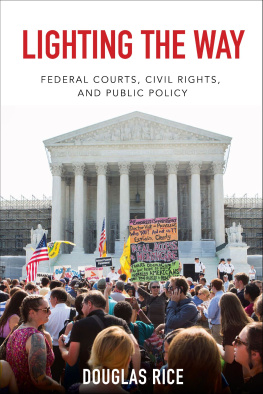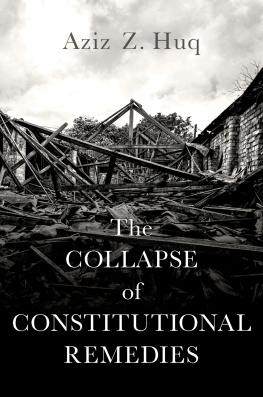WEAK COURTS, STRONG RIGHTS
WEAK COURTS, STRONG RIGHTS
JUDICIAL REVIEW AND SOCIAL WELFARE RIGHTS IN COMPARATIVE CONSTITUTIONAL LAW
Mark Tushnet
PRINCETON UNIVERSITY PRESS
PRINCETON AND OXFORD
Copyright 2008 by Princeton University Press
Published by Princeton University Press, 41 William Street, Princeton, New Jersey 08540
In the United Kingdom: Princeton University Press, 3 Market Place, Woodstock, Oxfordshire OX20 1SY
All Rights Reserved
Library of Congress Cataloging-in-Publication Data
Tushnet, Mark V., 1945
Weak courts, strong rights : judicial review and social welfare rights in comparative constitutional law / Mark Tushnet.
p. cm.
Includes bibliographical references and index.
eISBN: 978-1-40082-815-9
1. Judicial reviewUnited States. 2. Social rightsUnited States. 3. Judicial review.
4. Social rights. I. Title.
KF4575.T873 2008
347.73'12dc22
2007003095
British Library Cataloging-in-Publication Data is available
This book has been composed in Goudy
Printed on acid-free paper.
press.princeton.edu
Printed in the United States of America
10 9 8 7 6 5 4 3 2 1
TO MY COLLEAGUES
At the Georgetown University Law Center
Contents
Preface
THIS BOOK BRINGS together two of the important intellectual or theoretical issues of concern to students of comparative constitutional law as it has developed in the United States over the past decade. First, what is the proper role of courts in constitutional systems that generally comply with rule-of-law requirements? Second, what substantive rights do, should, or can constitutions guarantee? Should they protect second-generation social and economic rights and third-generation cultural and environmental rights, and if so, how, and in what venues? I argue that the comparative study of constitutions brings out underappreciated connections between the answers to these two questions.
The reason is that the new Commonwealth model of judicial review offers an important alternative to the form of judicial review familiar in the United States. In that new model, courts assess legislation against constitutional norms, but do not have the final word on whether statutes comply with those norms. In some versions the courts are directed to interpret legislation to make it consistent with constitutional norms if doing so is fairly possible according to (previously) accepted standards of statutory interpretation. In other versions the courts gain the additional power to declare statutes inconsistent with constitutional norms, but not to enforce such judgments coercively against a losing party. In still others, the courts can enforce the judgment coercively, but the legislature may respond by reinstating the original legislation by some means other than a cumbersome amendment process.
I call the new model of judicial review weak-form judicial review, in contrast with the strong form of judicial review in the United States. Strong-form review itself has numerous variants. At its heart is the power of courts to declare statutes enacted by a nations highest legislature unconstitutional, and to make that declaration practically effective by using the standard weapons at a courts handsinjunctions against further enforcement of the statute by executive officials, dismissals of prosecutions under the statute, awards of damages on behalf of people injured by the statutes operation backed up by the potential to seize the defendants property. (None of these weapons are powerful enough to defeat a recalcitrant legislature and executive backed by strong public opinion. The U.S. experience has never pushed strong-form review to the point where its exercise has provoked a real constitutional crisis when nonjudicial officials fight hard against a courts orders.)
Some variants of strong-form review involve differences in the degree to which courts defer to constitutional interpretations offered by the other branchesinterpretations sometimes described as being made by the legislature when it enacted the very legislation under constitutional challenge. Another variant confines strong-form review to areas directly implicating the courts themselves. This variant, sometimes called departmentalism, allows a court to strike down a statute unconstitutionally expanding or limiting its jurisdiction, the issue in the U.S. classic Marbury v. Madison (1803), or depriving plaintiffs of jury trials to which they are constitutionally entitled, and the like. Seemingly narrower than other variants of strong-form review, departmentalist review can actually be quite expansive, because any government seeking to operate reasonably effectively is likely to call upon the courts for assistance, at which point departmentalist strong-form review comes into play. A statute making flag burning as a means of political protest illegal, for example, does not in itself ask the courts to do anything, and so might seem immune from departmentalist strong-form review. Yet, as soon as prosecutors bring a criminal case against a flag burner, departmentalism kicks in, allowing the courts to dismiss the case if they see the executive branch prosecutors asking the courts help in enforcing what the judges find to be an unconstitutional statute. Yet another variant of strong-form judicial review is judicial supremacy, in which the courts judgments of constitutionality are taken to be conclusive on all constitutional issues that can be presented to the courts.
Every variant of strong-form judicial review raises basic questions about democratic self-governance, because every variant allows the courts to displace the present-day judgments of contemporary majorities in the service of judgments the courts attribute to the constitutions adopters. Of course, constitutionalism is all about limiting contemporary majorities. The problem with strong-form judicial review is that the courts determinations of what the constitution means are frequently simultaneously reasonable ones and ones with which other reasonable people could disagree. This is especially true when the courts interpret the relatively abstract statements of principle contained in bills of rights.
Take the issue of affirmative action as an example. A conscientious legislature could think about what the constitutions ban on discrimination means and decide that broad race-based affirmative action programs are consistent with the nations commitment to equality because such programs are appropriate ways of rectifying the legacy of a history of racism. The courts might conclude, in contrast, that the national commitment to equality means that legislation can take race into account only under much more restricted circumstances, and not merely to rectify historical injustices. The conclusions drawn by the legislature would hardly be unreasonable even if disputable. Yet, in a system of strong-form judicial review the courts different conclusion, it-self reasonable, prevails over the legislatures. This is a substantial restriction on the power of the people to govern themselves. Whenas if often the casereasonable people can disagree about what the constitution actually means in connection with challenges to particular statutes, the restriction on self-government is difficult to defend simply by invoking the basic idea of constitutionalism.
Proponents of the new model of weak-form judicial review describe it as an attractive way to reconcile democratic self-governance with constitutionalism. As Jeffrey Goldsworthy puts it, the new model offers the possibility of a compromise that combines the best features of both the traditional models, by conferring on courts constitutional responsibility to review the consistency of legislation with protected rights, while preserving the authority of legislatures to have the last word.
Next page
